Faculty receive endowed chairs; first Neubauer fellows join the faculty
The faculty members featured in these stories represent only a sample of faculty appointments made this year. To read stories about all of the newly appointed faculty members, please check the University’s Web site, where content of a New Faculty booklet will appear later in the Fall Quarter. All stories were written by Sarah Galer, William Harms, Steve Koppes, Josh Schonwald and Vanessa Sumo.
Last fall, Joseph Neubauer and Jeanette Lerman Neubauer established the Neubauer Family Fellows Program at the University with a $25 million commitment from the Neubauer Family Foundation to establish an innovative program to attract some of the nation’s most outstanding young faculty.
The gift (http://chronicle.uchicago.edu/071004/neubauers.shtml) helped the Chicago Initiative exceed its $2 billion fundraising goal and helped advance the University’s continuing journey to support the world’s leading scholars in discipline-defining, agenda-setting work.
Chicago Initiative donors added 105 new endowed professorships, including 29 over the last year and 16 in the month of June. The Neubauer Family Fellows Program supports tenure-track appointments for outstanding junior faculty members, who are named Neubauer Family Assistant Professors.
They receive research support to be used in any way they choose over a five-year professorship appointment.
This year, Agnes Callard and Katherine Kinzler join the faculty as Neubauer Family Assistant Professors.
Callard’s dissertation, An Incomparabilist Account of Akrasia, offers a new account of the relationship between reason and desire, using it to explain weak-willed action.
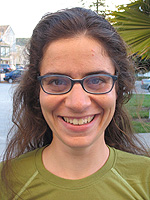 Agnes Callard | |
“Weakness of will” (akrasia) has puzzled philosophers since the time of Plato and Aristotle. A typical scenario illustrating weakness of will: She takes another cookie, though she thinks she should have stopped at two. Callard’s project is to generate an explanation of how weakness of the will is possible and to use the phenomenon to open space for a new account of what it is to be motivated to act. She argues that weak-willed action is the product of passive thought processes, ones not under the agent’s control.
Callard, who joins the University as the Neubauer Family Assistant Professor in Philosophy and the College, stresses the importance of the understanding of irrationality to study of the nature of action. She aims to call into question the rationalizing tendency in philosophy that equates intentional action with action for reasons.
Callard (A.B.,’97) received a Ph.D. in philosophy in 2008 from the University of California, Berkeley.
Kinzler joins the Chicago faculty as the Neubauer Family Assistant Professor in Psychology and the College. Her research on the origins of human social bias may help explain its malleability and potential for positive change.
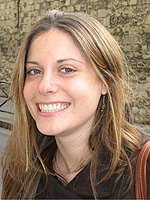 Katherine Kinzler | |
In her work, she asks: What are the developmental origins of human tendencies to divide the world into social groups and to prefer some novel individuals to others? How does early attention to social categories interact with other cognitive and social processes, such as memory for, interactions with and empathy for others?
Kinzler presents evidence that language provides a critical, and potentially primary, way in which children divide the social world.
She has found that from infancy throughout early childhood, children prioritize language and accent over race in guiding their early social preferences. Infants interact selectively with native speakers of their native language; they interact equally with own- and other-race individuals.
By kindergarten, though they pay attention to both language and race, accent “trumps” race in guiding children’s social preferences. For instance, they choose friends who speak with a native accent yet are of a different race, compared to other possible friends who are of the child’s race but speak in a foreign accent.
Kinzler received a Ph.D. from Harvard University in 2008.
Several members of the faculty have received newly funded endowed professorships. Their stories follow.
Dennis Carlton has been appointed the first Katherine Dusak Miller Professor of Economics in the Graduate School of Business. His professorship is funded with a gift from the late Katherine Dusak Miller (A.B.,’65, M.B.A.,’68, Ph.D.,’71).
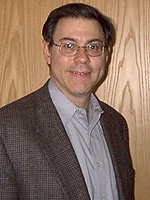 Dennis Carlton | |
Dusak Miller was a member of the Northwestern University faculty. Together with her husband, Nobel laureate and former Chicago faculty member Merton Miller, Dusak Miller is considered to have been one of the world’s foremost experts in the field of commodity futures prices.
Dusak Miller was the first scholar to apply modern financial theory to commodity futures prices. As treasurer of Sanwa Bank of Chicago, she was one of the first female American executives to hold a senior position in a Japanese company. In 1997, she was awarded the Alumni Service Citation for her many years of outstanding service to the University. Her fundraising efforts enabled the University to establish its first chair in Turkish studies, and she established two Ph.D. fellowships and the Katherine Dusak Miller Professorship at the GSB.
Carlton is an authority on industrial organization. He studies how industries operate, and he often looks at implications for antitrust policy and government regulation.
His extensive experience in the field of industrial organization has allowed him to serve as an expert in numerous domestic and foreign cases involving antitrust, regulation and intellectual property issues in various industries, ranging from airlines and energy to telecommunications.
Carlton has served as Deputy Assistant Attorney General in the Antitrust Division of the U.S. Department of Justice since 2006. He was the only economist on the Antitrust Modernization Commission, a Congressional commission that published its findings in 2007.
Carlton has published two books and more than 90 papers that span a wide range of topics. As Deputy Assistant Attorney General, he had the opportunity to meet antitrust officials from many countries, many of whom were trained using his textbook, Modern Industrial Organization (4th edition, 2004). Co-written with Jeffrey Perloff of the University of California, Berkeley, it is considered one of the leading textbooks in the field.
In addition to teaching at the Graduate School of Business, Carlton also lectures in the Law School and in Economics.
Carlton earned his Ph.D. in Economics from the Massachusetts Institute of Technology in 1975.
Randall Kroszner has been appointed the first Norman R. Bobins Professor of Economics in the Graduate School of Business. Bobins, who earned his M.B.A. at the GSB in 1967, retired in December 2007 as chairman of LaSalle Bank, after leading the bank through its longest period of uninterrupted growth in its 75-year history. This past July, Bobins was named chairman of PrivateBank-Chicago.
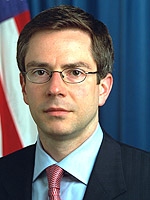 Randall Kroszner | |
To pay tribute to Bobins’ long record of service, the bank and several individual donors together established a professorship in his name. Bobins and his wife, Virginia, contributed to the professorship, along with the James Nicholson family. Nicholson (M.B.A.,’67), Bobins’ former GSB classmate, is president and chief executive of PVC Chemicals in Detroit.
Kroszner became a member of the Board of Governors of the Federal Reserve System in March 2006. In the recent mortgage market turmoil, he has been at the forefront of the central bank’s efforts to formulate rules to better protect consumers against improper lending practices without unduly restricting the availability of credit.
Kroszner has been a consultant to a number of regional Federal Reserve Banks, central banks and finance ministries around the world, as well as international financial institutions such as the International Monetary Fund and the Bank for International Settlements.
He served on the President’s Council of Economic Advisers from 2001 to 2003, where he was involved in helping form policies on a wide range of domestic and international issues. While at the CEA, Kroszner led an initiative to improve the quality of government statistics and enhance the protection of confidential data reported to the government, resulting in the Confidential Information Protection and Statistical Efficiency Act of 2002.
A prolific researcher, Kroszner has published more than 60 articles in academic journals, books and various periodicals, and has written a book and edited another. His research interests include banking regulation, corporate governance at both financial and non-financial firms, international banking and financial crises, debt defaults and monetary economics.
One of Kroszner’s highly cited papers looks into the evolution of corporate governance and managerial ownership since the Great Depression. The study revealed that contrary to a widespread view, managerial ownership of publicly traded firms was higher in 1995 than in 1935, partly because the development of financial markets gave managers better incentives to hold large equity stakes in firms. The article, co-authored with Clifford Holderness of Boston College and Dennis Sheehan of Pennsylvania State University, received the Brattle Prize for the best corporate finance paper published in the Journal of Finance in 1999.
Currently on leave from the GSB, Kroszner received his Ph.D. in Economics from Harvard University in 1990.
Tobias Moskowitz has been appointed the first Fama Family Professor of Finance in the Graduate School of Business. Several donors established the Fama Family Professorship to honor Eugene Fama, the Robert R. McCormick Distinguished Service Professor of Finance in the GSB.
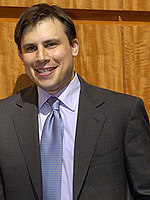 Tobias Moskowitz | |
Fama, who is widely known as the “father of modern finance,” is also one of the most cited researchers in America. The author of two books, Fama also has written more than 100 journal articles.
Recognized for his groundbreaking work on the efficiency of markets, Fama has received numerous awards, including the Chicago Mercantile Exchange’s Fred Arditti Award, the Nicholas Molodovsky Award from the CFA (Chartered Financial Analyst) Institute and the Deutsche Bank Prize in Financial Economics.
In 1960, Fama enrolled in the GSB at Chicago, where he earned his M.B.A. in 1963—when he also joined the faculty—and his Ph.D. in 1964.
Moskowitz has mainly focused his research on measuring things that are hard to pin down but essential for testing financial theories. This important contribution earned him the Fischer Black Prize in 2007 from the American Finance Association. He is only the second recipient of the prestigious prize for scholars under age 40, since it was established in 2002.
Moskowitz conducts his research by creating empirical proxies for elusive concepts such as asymmetric information or liquidation values that are often only known to market participants. In his work with Joshua Coval of Harvard University (Journal of Finance, 1999), they found that U.S. investment managers exhibit a strong preference for locally headquartered firms. This suggests that asymmetric information between local and nonlocal investors may be driving the propensity to invest closer to home.
In examining the impact of liquidation values on debt contracts (Quarterly Journal of Economics, 2005), Moskowitz and co-authors Efraim Benmelech of Harvard University and Mark Garmaise of the University of California, Los Angeles, measured an asset’s liquidation value by using commercial real estate loans and variation in zoning ordinances that govern the uses of property. They found that a property with more allowable uses is associated with larger loans and better lending terms.
Moskowitz received his Ph.D. in Finance from the Anderson School at the University of California, Los Angeles, in 1998.
David Nirenberg has been named the first Deborah R. and Edgar D. Jannotta Professor in Social Thought and the College.
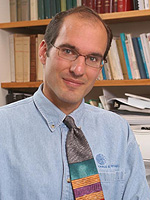 David Nirenberg | |
Edgar Jannotta has a long history of service to the University, having served as a longtime Trustee, including Chairman of the Board of Trustees from 1999 to 2003.
Jannotta’s support of the University extends to philanthropic support from himself and his wife, Deborah, whose contributions resulted in the naming of the Edgar and Deborah Jannotta Mesopotamian Gallery at the Oriental Institute.
The Jannottas’ belief in the importance of high-quality undergraduate education as a central and core mission of the University led to their establishing the Deborah R. and Edgar D. Jannotta Professorship. Jannotta, who had chaired the Chicago Initiative from 2002 to 2005, also created the Jannotta professorship to honor the faculty members with whom he worked closely on the presidential search for President Emeritus Don Randel.
Nirenberg is a historian whose work focuses on how Jewish, Christian and Islamic cultures developed through interacting with and thinking about each other in medieval Europe and the Mediterranean.
His first book, Communities of Violence: Persecution of Minorities in the Middle Ages, studied social interaction between the three groups within the context of Spain and France, in order to understand the role of violence in shaping the possibilities for coexistence.
His more recent projects have taken a less anthropological and more hermeneutical approach, exploring how Judaism, Christianity and Islam made sense of the world, in terms of each other.
He currently is working on two projects: a brief history of Judaism as a figure of thought in Christianity and Islam, and a study of the collapse of religious pluralism and the emergence of biological models of religious identity in medieval Spain.
Nirenberg serves on the editorial boards of the journals Medieval Encounters, History Compass, Journal of Religion in Europe, Journal of Medieval Iberian Studies and Modern Language Notes, and he is on the advisory board of the Stanford Humanities Center.
He received his Ph.D. from Princeton University in 1992 and taught at Johns Hopkins and Rice universities before joining the Chicago faculty in 2006.
Peter White has been named the first Herman C. Bernick Family Professor (see related story on Bernick gift on Page 4) in Classics and the College.
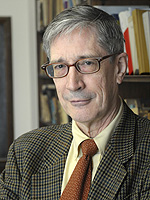 Peter White | |
White studies Greek and Latin literature, thought and poetry, with a special interest in the role of poets in the Roman Empire.
His book, Promised Verse: Poets in the Society of Augustan Rome, won the American Philological Association’s Goodwin Award in 1995. He is currently writing a book on Cicero’s letters.
White co-edited The Greek Polis, the first volume of the Readings in Western Civilization series, and the series’ second volume, Rome: Late Republic and Principate.
White has served as a member of the editorial board of Classical Philology, as Vice President for Publications for the American Philological Association, and as a leader of a 15-week seminar on Mesopotamia and Greece for Chicago Public School teachers.
A 1990 recipient of the University’s Llewellyn John and Harriet Manchester Quantrell Award for Excellence in Undergraduate Teaching, White often focuses on Roman comedy and satire, and Greek and Roman historiography, and St. Augustine in his classes.
White earned his Ph.D. from Harvard University in 1972 and joined the University faculty in 1968. He also has served two stints as Chair of Classics.
Joining the University faculty as the John P. Wilson Professor in the Law School, Brian Leiter hopes to extend the “Chicago school of non-nonsense jurisprudence” and help bring moral and legal philosophy into deeper contact with psychology, anthropology and cognate human sciences.
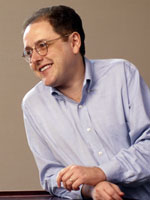 Brian Leiter | |
His work is animated by “philosophical naturalism,” the idea that human beings are seamless parts of the natural order as described by the empirical and human sciences, and that philosophical inquiry must be continuous with the results and methods of those sciences.
In his work, Leiter explores the implications of such a view through a sympathetic reconstruction and defense of thinkers neglected by mainstream moral and legal philosophy: the German moral philosopher Nietzsche and the American Legal Realists.
Leiter’s current book project, Why Tolerate Religion?, examines whether there is a principled reason for singling out religion—as against other matters of conscience—for toleration. He also is the author of Nietzsche on Morality and Naturalizing Jurisprudence: Essays on American Legal Realism and Naturalism in Legal Philosophy.
Leiter is Director of the Center for Law, Philosophy and Human Values at the Law School. He received a Ph.D. in 1`995 and a J.D. in 1987 from the University of Michigan. He comes to Chicago from the University of Texas, Austin.
Three members of the University faculty have received distinguished service professorships and eight others have been appointed to endowed chairs. These 11 scholars are among the 2008 faculty appointments, which include five first-time endowed professorships.
Stories about the research and teaching of current faculty members who have been appointed to well-established endowed professorships follow:
Steven Levitt, a leading micro-economist, has been named the William B. Ogden Distinguished Service Professor in Economics.
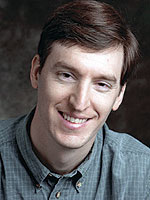 Steven Levitt | |
Levitt and co-author Steven Dubner wrote the 2005 best-seller, Freakonomics: A Rogue Economist Explores the Hidden Side of Everything. The book, which remained on the best-seller list for more than two years, showed how economists’ questions help people understand everyday situations such as cheating, crime, parenting and real estate deals.
Levitt, who is Director of the Becker Center on Chicago Price Theory at the Graduate School of Business, also is a faculty research fellow at the National Bureau of Economic Research and the American Bar Foundation.
Levitt was the 2003 winner of the prestigious John Bates Clark Medal from the American Economics Association, given for his pioneering and influential work on natural experiments in economics. The medal, bestowed every two years, recognizes the nation’s most outstanding economist under 40.
He was named in 2001 to the economics section of the American Academy of Sciences, received the National Science Foundation’s 2000 Presidential Early Career Award for Scientists and Engineers, and was honored with the University’s Llewellyn John and Harriet Manchester Quantrell Award for Excellence in Undergraduate Teaching in 1998.
He received a Ph.D. in 1994 from MIT and joined the University faculty in 1997, after serving as a junior fellow at the Harvard Society of Fellows.
Jeanne Marsh, one of the nation’s leading experts on the development and evaluation of social services for children and families, and Dean of the School of Social Service Administration, has been named the George Herbert Jones Distinguished Service Professor in SSA.
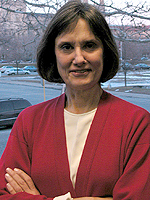 Jeanne Marsh | |
Her research focuses on substance abuse, social service provision for women and children, and knowledge utilization in practice and program decision-making. She is co-author of two books, Informing Practice Decisions, and Rape and the Limits of Law Reform.
In her research on the theories of organizations and social processes, she has identified effective social treatment for women and families.
Marsh is a 1997 recipient of the National Association of Social Workers’ Award for Excellence in Social Work Research.
From 1998 to 2002, she served as chair of the Council on Social Work Education Commission on Education Policy, where she helped develop policies and standards to guide the accreditation of all professional social work schools and programs in the United States.
Marsh joined the University faculty in 1978, and served an earlier term as Dean of SSA from 1988 to 1998. She began her new term as Dean in 2005. Under her leadership, SSA will launch a yearlong series of symposia and other activities to celebrate the school’s centennial.
Michael Forster has been named the Glen A. Lloyd Distinguished Service Professor in Philosophy and the College, effective Wednesday, Oct. 1.
Forster studies historical and systematic aspects of philosophy, focusing primarily on German philosophy and secondarily on ancient philosophy.
His work frequently examines epistemology, especially skepticism, and such central philosophical questions as the relation between thought and language, and the nature of meaning. But Forster also explores questions concerning the role of meaning and thought in apparently non-linguistic art—from animals’ capacities for language, meaning and thought, to the nature of both interpretation and translation.
His most recent books include Kant and Skepticism, Wittgenstein on the Arbitrariness of Grammar and Herder: Philosophical Writings. His 1998 book, Hegel’s Idea of a Phenomenology of Spirit, is a fresh examination of what is widely regarded as one of Hegel’s most important and impenetrable works.
Forster served as Chairman of the Philosophy Department from 1994 to 2004. He also is a board member of The Philosophical Gourmet, a publication that ranks philosophy departments in the English-speaking world, and an editorial board member and 19th-century editor for the Stanford Encyclopedia of Philosophy.
He received his Ph.D. from Princeton University in 1987 and joined the Chicago faculty in 1985.
Jean-Pierre Dubé’s work reflects his research training in empirical economics and his interest in issues in marketing.
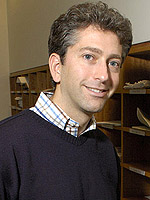 Jean-Pierre Dubé | |
Dubé, who has been named the Sigmund E. Edelstone Professor of Marketing in the Graduate School of Business, brings economic theory into the design of empirical models to study pricing and advertising strategies in an environment with competitive reactions by rivals.
For example, one of his recent papers, “Do Switching Costs Make Markets Less Competitive?” co-authored with GSB colleagues Günter Hitsch and Peter Rossi, challenges the conventional wisdom in economic theory that switching costs—the costs for a consumer to switch to a competing brand or product—makes markets less competitive, causing prices to be higher than otherwise.
In the presence of switching costs, firms face two incentives in setting their prices. On the one hand, the incentive to harvest their base of loyal customers puts upward pressure on prices. At the same time, the incentive to invest in future loyal customers puts downward pressure on prices. The net effect on prices depends on the relative magnitude of the investment and harvesting motives. In an empirical model of consumer demand with switching costs, the authors show that the additional competitive incentive to lower prices to defend one’s self against competitors can exacerbate the investment motive. In some situations, the result can be for prices to be lower in equilibrium than in the absence of switching costs.
Dubé also has pursued a stream of research that studies the persistent role of brand history on current performance. The paper “Brand History, Geography, and the Persistence of Brand Shares,” co-authored with GSB colleague Sanjay Dhar and University of Tilburg professor Bart Bronnenberg, documents a persistent effect from differences in the order-of-entry of competing brands on their current relative brand shares and quality perceptions across US cities.
The historic order of entry also appears to correlate with the current rank-order of brand shares across cities, leading to large asymmetries across markets in brand shares and in quality perceptions. This persistence is particularly striking since many of the brands studied originated during the mid-to-late 19th and early 20th centuries, roughly a century prior to the sample period of the market share and quality perception data.
Dubé earned his Ph.D. in Economics from Northwestern University in 2000.
Treating children with complex neurosurgical conditions has been the focus of David Frim’s clinical work. Recently named the Ralph Cannon Professor in Surgery and Chief of Neurosurgery, Frim specializes in complex surgical procedures to treat hydrocephalus and congenital anomalies of the nervous system such as syringomyelia and myelodysplasia.
He is a national leader in the treatment of Chiari malformation, a brain protrusion at the base of the skull and top of the neck that restricts the flow of cerebrospinal fluid. In addition, he has interests in the surgical treatment of epilepsy, brain and spine tumors, and pediatric neurovascular disease, using minimally invasive approaches, such as neuro-endoscopy, when possible. In many cases, Frim’s patients are able to live with dramatically less pain and better quality of life because of these treatments.
His clinical research focuses on the intracranial pressure dynamics of hydrocephalus and other diseases that affect cerebrospinal fluid dynamics. Most recently, Frim and his colleagues have been studying the cognitive outcome of hydrocephalus patients relative to treatment strategy. Frim’s laboratory group investigates the neuroprotective effects of surfactant poloxamer molecules in various models of neural injury.
Frim earned his medical degree and a Ph.D. in Neurobiology from Harvard Medical School.
Erik Hurst, the newest holder of the endowed chair, the V. Duane Rath Professor of Economics in the Graduate School of Business, focuses his research on household financial behavior. Hurst has explored such issues as the determinants of household bankruptcy decisions, the potential barriers to household entrepreneurship and the similarities in financial behavior between parents and their children.
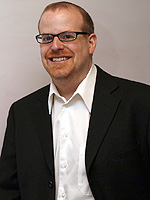 Erik Hurst | |
Perhaps his most important contribution has been his work on household consumption. Prior to his work in this area, researchers and policy-makers often concluded that Americans do not put aside enough money for their retirement because retirees seem to spend less money on food. However, by taking “home production” into account, Hurst and co-author Mark Aguiar found that what retired people eat does not deteriorate in quantity or quality, they just spend more time cooking and shopping for better deals.
Busy people with children and demanding jobs may choose to buy a prepared salad, even if it costs more, because the value of their time is very high. Retirees, however, have abundant time to shop and cook meals.
Other researchers who have not accounted for how households use their time have come to erroneous conclusions about household spending and saving patterns.
One of Hurst and Aguiar’s papers on this subject, “Consumption versus Expenditure,” won the TIAA-CREF Paul Samuelson Award for outstanding scholarly writing on lifelong financial security in 2006.
Hurst received his Ph.D. in Economics from the University of Michigan in 1999.
Working with researchers last year in China, University geneticist Bruce Lahn created a viable interspecies “chimera”—a single organism with cells from two evolutionarily highly divergent species.
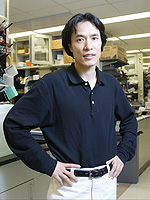 Bruce Lahn | |
Lahn, who has been appointed the William B. Graham Professor in Human Genetics and the College, studies evolutionary genetics, human brain evolution and stem cell biology.
His work has shown that two genes linked to the regulation of brain size have evolved rapidly in the evolutionary lineage leading to humans, and there is evidence that both genes are still evolving toward new forms in modern humans.
In 2006, Lahn and his research colleagues published evidence that the advantageous form of the microcephalin gene appears to come from rare interbreeding between early humans and a now-extinct Homo species, such as the Neanderthal. His lab also investigates the functions and therapeutic applications of embryonic and adult stem cells. The researchers are seeking an explanation for the molecular mechanisms that render pluripotency to stem cells.
Lahn, who also is a Howard Hughes Medical Institute Investigator, holds a Ph.D. from the Massachusetts Institute of Technology. He is the founder and scientific director of the Center for Stem Cell Biology and Tissue Engineering at Sun Yat-sen University in China.
Christian Leuz, who has been named the Joseph Sondheimer Professor of Accounting in the Graduate School of Business, studies the role of corporate disclosure, accounting transparency and disclosure regulation in corporate governance, capital markets and corporate financing.
 Christian Leuz | |
Among his most widely cited research is a study written with Robert Verrecchia, which found a greater commitment to company disclosure lowers the cost to firms of acquiring capital, presumably because it overcomes the reluctance of potential investors to trade securities of these firms or place money in them.
A related paper, which he co-wrote with Luzi Hail and which won a Geewax, Terker and Company Prize in Investment Research in 2004, showed that firms in countries with more extensive disclosure requirements, stronger securities regulation and stricter enforcement mechanisms have a significantly lower cost of equity capital.
In another study, Leuz examined with colleagues the link between earnings management and investor protection, finding that the practice of manipulating reported earnings is more pervasive in countries where legal protection of investors and corporate governance are weaker.
Leuz’s work is relevant to many policy questions and has been used by policy-makers in deliberations of issues, such as whether the United States should abandon the Generally Accepted Accounting Principles in favor of the International Accounting Standards that most countries have adopted.
Leuz earned a doctorate in business administration in 1996 and a postdoctoral degree in 2000, both from Johann Wolfgang Goethe Universität, Frankfurt.
Jens Ludwig, an economist who studies violence and urban poverty and is co-leading a major study of youth violence in Chicago, has been named the McCormick Foundation Professor of Social Service Administration, Law and Public Policy.
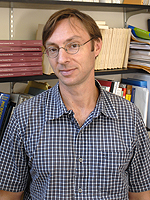 Jens Ludwig | |
In the spring, Mayor Richard Daley announced that Ludwig and Harold Pollack, Associate Professor in the School of Social Service Administration, would lead a team of University and national scholars to work with the city to develop interventions to reduce youth crime within a framework that allows these new pilot programs to be rigorously evaluated.
The project, called the University of Chicago Crime Lab, builds on Ludwig’s research career, which includes work on education, social policy, crime, housing and urban policy.
He was co-author with Duke University professor Phillip Cook of Gun Violence: The Real Costs, and was co-editor with Cook of Evaluating Gun Policy.
In 2006, the Association for Public Policy Analysis and Management awarded Ludwig the David Kershaw Prize for distinguished contributions to public policy by age 40.
Ludwig, who is a Research Associate with the National Bureau of Economic Research and Non-Resident Senior Fellow in Economic Studies at the Brooks Institution, taught at the University’s Law School as a Visiting Professor before joining the Chicago faculty in 2007.
Ludwig received a Ph.D. in economics from Duke University in 1994.
Tomas Philipson, who studies the impact of economics on major health issues such as obesity, longevity and epidemiology, has been appointed the Daniel Levin Professor of Public Policy Studies in the Irving B. Harris Graduate School of Public Policy Studies.
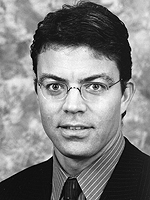 Tomas Philipson | |
His recent award-winning study, “Who Benefits from New Medical Technologies? Estimates of Consumer and Producer Surpluses for HIV/AIDS Drugs,” found that the increased HIV/AIDS survival rate due to drug treatments developed between 1980 and 2000 had an overall estimated economic benefit of $1.4 trillion, only 5 percent of which was reaped by their innovators. Philipson and co-author Jena Anupam warned that these results could remove incentives for drug producers to continue HIV/AIDS research.
Research America awarded Philipson and Anupam the 2007 Eugene Garfield Award for the paper, considered the best in the field of health economics.
Among his many awards, he also has twice (in 2000 and 2006) been honored with the Kenneth Arrow Award, given by the International Health Economic Association and considered the highest honor in his field.
Philipson is co-editor of the journal Forums for Health Economics and Policy and sits on the editorial board of the journal Health Economics.
He received his Ph.D. in economics from the University of Pennsylvania and his A.M. from the Wharton School of the University of Pennsylvania in 1989. In addition to his professorship at the Harris School, he also serves on the Economics and the Law School faculties.
Robert Shimer, a specialist in labor markets, has been named the Alvin H. Baum Professor in Economics and the College.
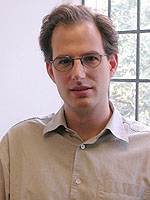 Robert Shimer | |
Shimer’s work on employment provides fresh insights on reasons for large fluctuations in the unemployment rate. He has looked at topics such as job mismatch and the relationship between wages people desire and their use of unemployment insurance.
He uses search models to study the time workers need to find jobs and employers to find employees, and he examines other aspects of employment searches, such as when workers choose inappropriate jobs and firms hire inappropriate workers. Shimer also studies the impact of job search on distortions in the economy, such as company investment decisions.
He is the author of numerous papers, including “The Cyclical Behavior of Equilibrium Unemployment and Vacancies” and “Mismatch,” both published in the American Economic Review, and “Efficient Unemployment Insurance,” published in the Journal of Political Economy.
An Alfred P. Sloan Research Fellow, Shimer also serves as editor of the Journal of Political Economy. Shimer received a Ph.D. in economics from the Massachusetts Institute of Technology in 1996. He taught economics at Princeton University before coming to Chicago, where he has been a Professor in Economics since 2003.
![[Chronicle]](/images/sidebar_header_oct06.gif)